Related Research Articles
Occupational therapists (OTs) are health care professionals specializing in occupational therapy and occupational science. OTs and occupational therapy assistants (OTAs) use scientific bases and a holistic perspective to promote a person's ability to fulfill their daily routines and roles. OTs have training in the physical, psychological, and social aspects of human functioning deriving from an education grounded in anatomical and physiological concepts, and psychological perspectives. They enable individuals across the lifespan by optimizing their abilities to perform activities that are meaningful to them ("occupations"). Human occupations include activities of daily living, work/vocation, play, education, leisure, rest and sleep, and social participation.

Occupational therapy (OT) is a healthcare profession that involves the use of assessment and intervention to develop, recover, or maintain the meaningful activities, or occupations, of individuals, groups, or communities. The field of OT consists of health care practitioners trained and educated to improve mental and physical performance. Occupational therapists specialize in teaching, educating, and supporting participation in any activity that occupies an individual's time. It is an independent health profession sometimes categorized as an allied health profession and consists of occupational therapists (OTs) and occupational therapy assistants (OTAs). While OTs and OTAs have different roles, they both work with people who want to improve their mental and or physical health, disabilities, injuries, or impairments.

Adolf Meyer was a Swiss-born psychiatrist who rose to prominence as the first psychiatrist-in-chief of the Johns Hopkins Hospital (1910-1941). He was president of the American Psychiatric Association in 1927–28 and was one of the most influential figures in psychiatry in the first half of the twentieth century. His focus on collecting detailed case histories on patients was one of the most prominent of his contributions. He oversaw the building and development of the Henry Phipps Psychiatric Clinic at Johns Hopkins Hospital, opened in April 1913, making sure it was suitable for scientific research, training and treatment. Meyer's work at the Phipps Clinic is possibly the most significant aspect of his career.
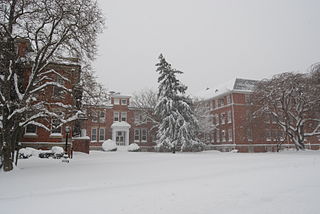
The Crownsville Hospital Center was a psychiatric hospital located in Crownsville, Maryland. It was in operation from 1911 until 2004.
A mental health professional is a health care practitioner or social and human services provider who offers services for the purpose of improving an individual's mental health or to treat mental disorders. This broad category was developed as a name for community personnel who worked in the new community mental health agencies begun in the 1970s to assist individuals moving from state hospitals, to prevent admissions, and to provide support in homes, jobs, education, and community. These individuals were the forefront brigade to develop the community programs, which today may be referred to by names such as supported housing, psychiatric rehabilitation, supported or transitional employment, sheltered workshops, supported education, daily living skills, affirmative industries, dual diagnosis treatment, individual and family psychoeducation, adult day care, foster care, family services and mental health counseling.

The Austen Riggs Center is a psychiatric treatment facility in Stockbridge, Massachusetts. It was founded by Austen Fox Riggs in 1913 as the Stockbridge Institute for the Study and Treatment of Psychoneuroses before being renamed in honor of Austen Riggs on July 21, 1919.

The American Occupational Therapy Association (AOTA) is the national professional association established in 1917 to represent the interests and concerns of occupational therapy practitioners and students and improve the quality of occupational therapy services. AOTA membership is approximately 63,000 occupational therapists, occupational therapy assistants, and students.

Mt. Washington Pediatric Hospital is a United States 102-bed non-profit children's hospital set in the scenic neighborhood of Mt. Washington in Baltimore, Maryland, that provides long-term care for children with complex health problems. MWPH is jointly owned by Johns Hopkins Medical System and University of Maryland Medical System. Funded by patient revenue and private charitable donations, Mt. Washington Pediatric Hospital is a comprehensive sub-acute care facility for children from birth to young adult; MWPH provides transitional and support care for a variety of conditions, including premature birth, serious and chronic illness, traumatic injury, ADHD, autism spectrum disorder, cerebral palsy, childhood obesity, diabetes, feeding problems, among others. Mt. Washington Pediatric Hospital also has a unit at Prince George's Hospital Center in Cheverly, Maryland. MWPH accreditations include Commission on Accreditation of Rehabilitation Facilities and The Joint Commission.

The Utah State Hospital (USH) is a mental hospital located in eastern Provo, Utah, United States of America. The current superintendent is Dallas Earnshaw.

Henry Mills Hurd was the first director of the Johns Hopkins Hospital and remained in that post for 22 years (1889–1911) following which he was appointed Secretary to the Board of Trustees (1911–1927). He was also the first Professor of Psychiatry at the medical school from its opening in 1893 until 1905.
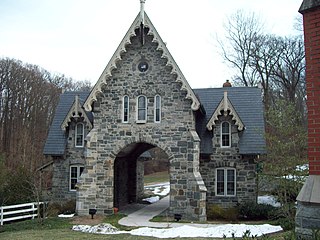
The Sheppard and Enoch Pratt Hospital, known to many simply as Sheppard Pratt, is a psychiatric hospital located in Towson, a northern suburb of Baltimore, Maryland. Founded in 1853, it is one of the oldest private psychiatric hospitals in the nation. Its original buildings, designed by architect Calvert Vaux, and its Gothic gatehouse, built in 1860 to a design by Thomas and James Dixon, were designated a National Historic Landmark in 1971.
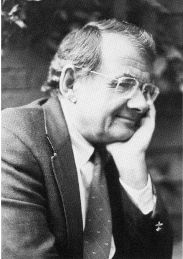
Leston Laycock Havens was an American psychiatrist, psychotherapist and medical educator.

Edward Nathaniel Brush was an American physician, a mental hospital administrator, and an editor of psychiatric journals.
Walter Earl Barton, M.D. (1906–1999) was an American physician, a psychiatric administrator, and a leader in American psychiatry.
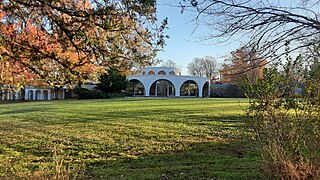
Sheppard Pratt at Ellicott City was a private psychiatric hospital located in Ellicott City, Maryland. It had a 20-bed adult unit, an 18-bed co-occurring disorders unit, an 18-bed crisis stabilization unit, a 22-bed adolescent unit, and an adult day hospital. The hospital was owned and operated by the Towson, Maryland based Sheppard Pratt Health System
Antara is a mental health institution located on the outskirts of Kolkata, India. It is operated by the Antara Society. Antara was established in 1971 and got Registered in 1972 by a group of like minded psychiatrists and other mental health professionals.

Vidyasagar Institute of Mental Health and Neuro and Allied Sciences (VIMHANS) is a mental healthcare institution in South Delhi. It was founded in 1987 as a tribute to the Indian psychiatrist Vidya Sagar.
Mark S. Komrad is an American psychiatrist on the clinical and teaching staff of the Johns Hopkins Hospital in Baltimore. He is the author of You Need Help: A Step-by-Step Plan to Convince Your Loved One to Get Counseling.
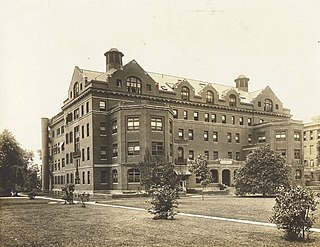
The Henry Phipps Psychiatric Clinic is a psychiatric school and clinic in Baltimore, Maryland. Proposed in 1908 as the first of its kind in the United States, the clinic opened on April 16, 1913 as a new section of Johns Hopkins Hospital. After a visit to the hospital to check on his other investments in the Phipps Tuberculosis Dispensary, Henry Phipps decided to donate $1.5 million to fund psychiatry at Johns Hopkins. William Welch, dean of the Johns Hopkins School of Medicine, quickly appointed Adolf Meyer as the director of the clinic, a renowned psychiatrist at the time.
Susan Edith Tracy was an American registered nurse who developed invalid occupations as a branch of nursing.:118 Tracy was a founder member of the National Society for the Promotion of Occupational Therapy. She was an educator and author, instigating the first training course about occupation and writing the first textbook about the therapeutic benefits of occupation.
References
- ↑ "William Rush Dunton, Jr".
- ↑ "Occupational Therapy & Rehabilitation" Feb. 1947 26:1, 47
- 1 2 The Alan Mason Chesney Medical Archives of The Johns Hopkins Medical Institutions "William Dunton"
- ↑ "Dr. W.R. Dunton Pioneer in Mental Disease, is Dead" 24 Dec. 1966 The Sun , A15
- ↑ Frederick E. Knowles, II M.D. "Memories of Br. Dunton" Maryland Psychiatrist Newsletter June 1995 22:3
- 1 2 Karen Alexander, "William R. Dunton: Quilt Collector, Author, Psychiatrist,"29 Mar. 2009
- ↑ John Dorsey, "Threads of Art are Sewn into Album Quilts" 6 Mar. 1994 The Sun, H1
- " Dr. W.R. Dunton Pioneer in Mental Disease, is Dead" 24 Dec. 1966 The Sun, A15
- Frederick E. Knowles, II M.D. "Memories of Br. Dunton" Maryland Psychiatrist Newsletter June 1995 22:3<http://www.dunton.org/archive/biographies/William_Rush-Dunton-Jr.htm>
- John Dorsey, "Threads of Art are Sewn into Album Quilts" 6 Mar. 1994 The Sun, H1.
- Karen Alexander, "William R. Dunton: Quilt Collector, Author, Psychiatrist," 29 Mar. 2009 <http://www.thequiltsshow.com/os/articles.php/articles_id/34>
- "Occupational Therapy & Rehabilitation" Feb. 1947 26:1, 47 <http://journals/wwom/ajpmr/citation/1947/02000/William-Rush-Dunton-Jr.aspx>
- "William Dunton" <http://www.medicalarchivesjhmi.edu/papers/dunton.html>